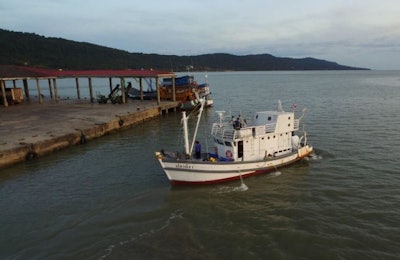
Photo courtesy: Thai Union
The Environmental Justice Foundation (EJF) has sounded the alarm over the possibility that fish caught by enslaved migrants and through other illegal fishing practices could end up as raw materials for pet food once again if the Thailand government gives in to the demands of a local fishing group.
The EJF reported that the National Fishing Association of Thailand (NFAT), in a closed-door meeting with the government, recently demanded the lifting of restrictions which the EJF believes could make the fishing industry less transparent and accountable just like in the past.
Controversial demands could set back human rights, endanger supply chain
The most controversial of NFAT's demands is for crew and catch transfers at sea be allowed which, EJF said, would let abusive vessel owners swap enslaved migrants between vessels so that they almost never make landfall, with almost zero chance of escape or detection by the authorities. It would also allow operators to launder illegally caught fish between boats so the product is no longer traceable, allowing it to make its way into international supply chains undetected, the EJF added.
In 2013, the EJF discovered cases of human trafficking, forced labor and even incidences of violence and murder in the Thai fishing industry, with the seafood ultimately entering a diverse number of supply chains that include pet food for the European Union and U.S. markets.
EJF said NFAT also wants the annual inspection of vessel and crew to be abolished. EJF pointed out that relaxing such a restriction risks having unregistered crew or trafficked migrants on board after the vessels have passed through “port-out” inspections.
EJF, others register protests
The EJF, along with 35 other organizations of major retailers, suppliers and NGOs, are presenting a letter to Thailand’s prime minister to condemn NFAT's demands and urge the government to protect reforms and not allow the country's fleet to return to its abusive and illegal past.
“The reforms brought in by the Royal Thai Government have had a hugely positive impact on Thailand’s fisheries and the entire region of Southeast Asia,” said Steve Trent, EJF’s executive director. “They have been crucial to the country’s economy, fish stocks and international reputation. They must not be lost to the self-serving, short-term interests of a few rogue companies in the form of NFAT. What possible reason is there for scrapping these safeguards other than to obscure the fact workers’ human rights and national laws are being disregarded?”
In 2015 and 2016, watchdog Greenpeace identified certain recipes or flavors of Fancy Feast by Nestlé Purina PetCare, Meow Mix by J.M. Smucker Company and Whiskas and Iams by Mars that unwittingly used seafood ingredients tainted by slavery. Nestlé has since then pledged to ban transshipment at sea to help end illegal, unreported, unregulated (IUU) fishing and human rights abuses against seafarers.
Meanwhile, the EJF said key business networks — including the Thai Chamber of Commerce and Thai Fishery Producers Coalition — have recognized the reforms in the Thailand fishing industry as a turning point for the country's fisheries sector that helped secure renewed trust from many import countries.

















